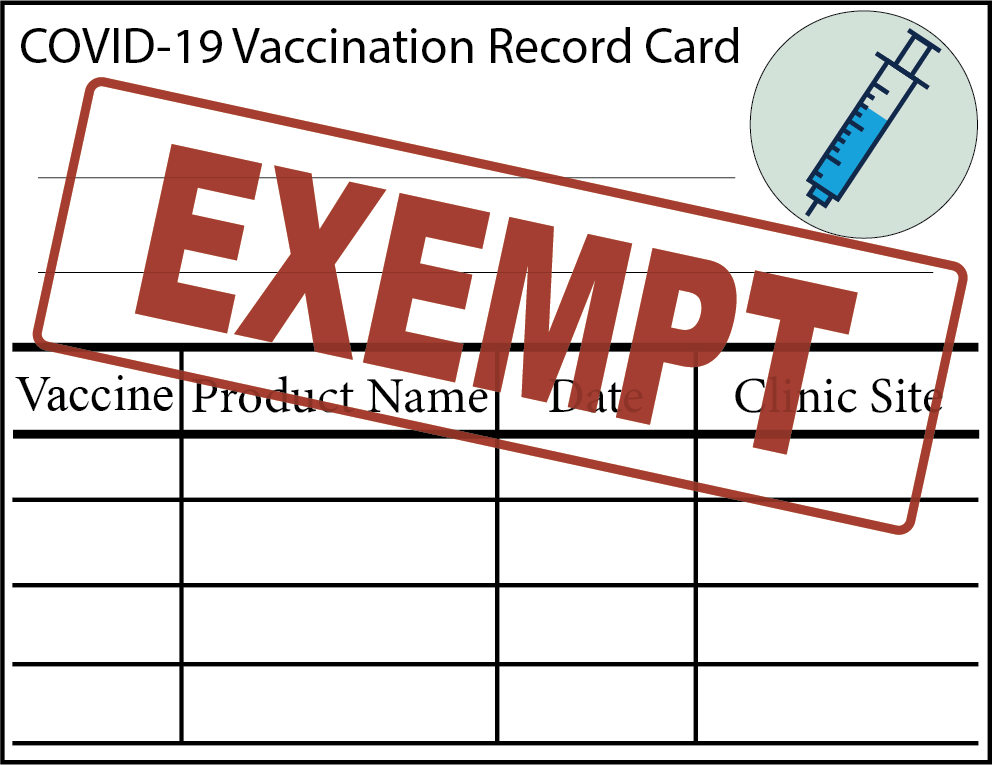Graphic by Emma Nobbe.
LILLY THUMM | STAFF REPORTER | lthumm@butler.edu
The COVID-19 vaccine has been a topic where truth and misinformation have blurred since its origination in 2020. The CDC provides information explaining the vaccine and the science behind it, but the option to pass on receiving the vaccine has been put in place across the world. Butler University is no different.
Last semester, students awaited the release of the vaccine and the opportunity to receive it on campus. Now, students, faculty and staff are living with Butler’s vaccine policy in place. Part of that policy is a vaccine exemption, which broadly allows for members of the Butler community to request a pass as long as they follow the guidelines. Some of these guidelines include COVID-19 testing throughout the semester, a requirement to wear masks everywhere, a 10 day quarantine period if contact traced and not being eligible for study abroad.
Brent Rockwood, vice president, chief of staff, has worked on COVID-19 policies for Butler since the start of the pandemic, mainly as part of a crisis management team. He said he feels that, overall, the university’s response to the virus this year is very similar to that of last year.
“We remain very aggressive in mitigating the spread,” Rockwood said. “And our policy, all along the way, has been to use the best available information to make the best decisions for our Butler community.”
Rockwood said the biggest change from last year’s policies regarding the virus is the vaccine requirement.
“The credit belongs to President Danko for making that decision months ago, because we know that the vaccine is really our best defense in terms of mitigating the spread of the virus on our campus,” Rockwood said.
Philip King, assistant professor of pharmacy practice, was in agreement with Rockwood.
“In my opinion, I think that Butler took a real scientific and pragmatic approach,” King said. “And I think it’s been more than appropriate.”
By looking at the statistics, it is clear that many students, faculty and staff did choose to get the vaccine. The Butler community is just above 93% vaccinated with about 4% of people who have an exemption. However, this leaves 3% unaccounted for. Rockwood said these students are in violation of Butler’s policy, and Student Affairs is working with them to address the situation. These students receive email reminders and have holds placed on their accounts.
Hope Wampler, a sophomore dance performance major, spoke to her experience as a student and dancer knowing the potential that some of her classmates may be unvaccinated.
“… it’s been very emphasized that we need to take care of ourselves and our own health. To take care of everyone else who’s around us,” Wampler said.
The university requires masks indoors and the same goes for dancers during classes and rehearsals. However, Wampler noted a lot of other rigid restrictions have been lifted in terms of social distancing and partner work.
“I know everyone who I’m dancing with,” Wampler said. “I tend to trust [them]. They are also doing the same as I am doing and trying to look out for everyone.”
Wampler said that, overall, unvaccinated students are not her biggest worry so much as the state of the world in general. She said it can be hard to not have those thoughts on her mind with how difficult conversations about COVID-19 and the vaccine can be.
“[Unvaccinated students] don’t owe me why they’re not getting vaccinated,” Wampler said. “But then at the same time, people are dying because people aren’t getting vaccinated. So it’s kind of like a dichotomy of trying to balance those ideas.”
King said the vaccine is science like any other prescription of medication a doctor prescribes. While King said he agrees nothing about COVID-19 or the vaccine is black and white, he also understands the way the virus works and how the vaccine responds to it.
“There are some legitimate reasons why certain individuals shall not receive a vaccine, many of these cases are extremely rare,” King said. “And I think that a lot of the reasons individuals give are not based on real science … they’re maybe hearing those things from different sources that are not necessarily what we would consider reliable in the medical community.”
The Butler exemption policy, King said, is very broad in terms of what can be considered a reason for an exemption. There are three kinds of exemptions: personal, medical and religious.
“I think it’s a very reasonable and fair exemption policy,” King said.
When looking at health concerns, however, and reasons to not get the vaccine, King said there is a contradiction in claiming a negative health reaction to the vaccine.
“You wouldn’t know that you had anaphylaxis to [the vaccine] if you never had it before,” King said, “So that essentially comes down to, there is no legitimate [health] exemption.”
King said a reaction to a first dose could lead to hesitation about getting the second one which is reasonable. A second negative reaction, however, can be avoided by alerting medical professionals who can monitor a person and prepare medication in case of a severe reaction.
As for what makes up the vaccine, King said substances such as sorbitol and polyethylene glycol are used which are also commonly found in foods, prescriptions and natural medications.
King said his bottom line is simple: the world is bigger than just one person. He has been treating patients in a COVID-19 ward since the start of the pandemic and has seen hundreds to thousands of patients with severe reactions and even death from the virus. However, he hasn’t had one patient with a medical complication from the vaccine.
“It’s like on an airplane,” King said. “Put your mask on first before you can help other people. Protecting yourself allows you to better protect others…like wearing a seatbelt or bicycle helmets, because the science says that those things are safe. How is a vaccine any different?”



